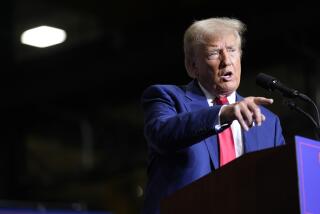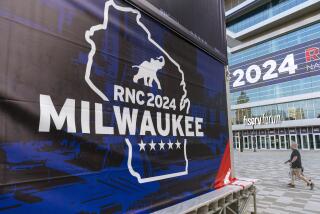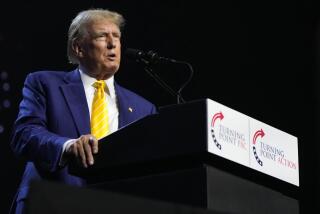Pope Urges Bush to Reject Human Embryo Cell Research
Pope John Paul II, weighing in on the most complex political issue facing the U.S. administration, told President Bush on Monday that the use of human embryos for medical research is an “evil” akin to abortion and infanticide.
After his first meeting with the Roman Catholic leader, Bush promised to “take that point of view into consideration” as he decides whether to permit government funding for the fledgling science, which destroys embryos to extract stem cells that could help cure fatal diseases.
The frail, 81-year-old John Paul led his guest gently by the hand into his summer retreat for a protocol visit with great symbolic value in Bush’s intense courtship of Catholic voters. But the pontiff’s unexpected public lobbying put the president on the spot.
With Bush sitting stiffly and respectfully at his side, as if in church, the pope warned against “a tragic coarsening of consciences” that has led from the practice of abortion to “acquiescence in . . . related evils such as euthanasia, infanticide and, most recently, proposals for the creation for research purposes of human embryos, destined for destruction in the process.”
“A free and virtuous society, which America aspires to be, must reject practices that devalue and violate human life at any stage from conception until natural death,” John Paul declared.
A papal audience is routine for recent U.S. presidents visiting Italy, but rarely does the timing allow the pope to thrust himself so firmly into a debate at the center of American politics.
After taking office in January, Bush suspended $400 million a year in federal funding for stem cell research pending a review. He is expected to decide by the end of August whether to resume the funding.
Embryonic stem cells, first isolated in 1998, have drawn wide interest because they can produce any other tissue in the body--nerve cells, heart muscle, insulin-producing cells and the like.
Scientists hope to use the cells to grow replacement tissue for people with heart disease, diabetes, muscular dystrophy, Parkinson’s disease and other ailments. The pope himself suffers from Parkinson’s, a degenerative nerve disorder that caused his hand to shake and his speech to slur as he read his remarks to Bush.
The Vatican and some other foes of abortion hold that an embryo must be treated as a human being and cannot be created or destroyed in a laboratory or be experimented upon. It was that moral teaching that John Paul reaffirmed Monday.
Stem cells can be extracted harmlessly from adults--from bone marrow, for example. In a speech last year, the pope urged the use of adult stem cells as the proper method of stem cell research.
But because the use of adult cells has scientific drawbacks--they take longer to find and are harder to develop into the specialized cells required for treatment--many scientists insist that research should go forward on embryonic stem cells.
Bush did not mention the controversy in his remarks to the pope. At a news conference later, with Italian Prime Minister Silvio Berlusconi, Bush said that he respects the views of “someone as profound as the holy father” but that his administration’s choice will be “unusually deliberative” and “very difficult.”
“It’s an issue that on the one hand deals with such hope, hope that perhaps through research and development, we’ll be able to save lives,” Bush said. “It’s also an issue that has got serious moral implications, and our nation must think carefully before we proceed.”
The pope’s remarks raised the political stakes for Bush, who enjoys growing support among churchgoing Catholics; many could be alienated if Bush defies the pope. On the other hand, the president is under pressure from some prominent conservatives--even some foes of abortion--to back embryo research.
Some advisors had urged Bush to make his decision before coming to Italy for last weekend’s Group of 8 summit in Genoa. They said he ran a lesser risk of offending the pope or appearing to be swayed by him if he decided before the trip.
The pope’s statement appeared to catch White House officials off guard. They had said in advance that embryo research wouldn’t come up. Bush said the pope did not mention it in a 30-minute private meeting before their public remarks.
“I don’t see how this helps Bush,” said a senior Republican in Washington who has served in previous administrations. “I don’t see how this isn’t a conflict of church and state. It looks like Bush is waiting to get divine intervention.”
Americans on both sides of the debate seized on the pope’s remarks.
Sean Tipton, spokesman for the American Society for Reproductive Medicine, said the pope appeared to be ruling out only the creation of embryos for research--not the use of stem cells from surplus embryos donated by patients at fertility clinics, which Bush is considering.
“If the pope is making that distinction, then it seems to give the president room to make the same distinction,” said Tipton, whose organization supports embryo research.
But Vatican spokesman Joaquin Navarro-Valls confirmed Monday that the pope opposes any medical research on embryos--even if his speech to Bush did not detail Catholic teaching on the full range of options for creating stem cells.
“I do not see how anyone could read anything less categorical into the pope’s message,” said Cardinal Roger M. Mahony, archbishop of Los Angeles.
“I just pray that God blesses the president with the ability to say no to this destructive research,” said Judie Brown, president of the anti-abortion American Life League. The pope’s point, she added, “is that we’re looking to be told precisely when we can kill and not kill, but that it should never be done for any reason.”
Vatican officials are delighted by Bush’s anti-abortion stance and view him as a closer moral ally than President Clinton, who supported abortion rights. Perhaps because abortion is a prime litmus test, John Paul did not lecture Bush on the death penalty, which the president supports but the church opposes.
Bush was effusive in praise of John Paul, saying, “I am not poetic enough to describe what it’s like to be in his presence.” Citing the name of one of the pope’s encyclicals, the president told his host: “You have shown the world not only ‘the splendor of truth,’ but the power of truth to overcome evil and redirect the course of history.”
The president brought First Lady Laura Bush and their daughter Barbara, 19, on the visit to the Apostolic Palace, the summer residence of popes since the 17th century. The Bush women, both Methodists, observed an old Catholic tradition and covered their heads with black lace mantillas.
Continuing his courtship of U.S. Catholic leaders, Bush later paid a call on American cardinals Edmund Szoka and James Stafford, who serve in the Curia, or Vatican administration.
*
Boudreaux reported from Castel Gandolfo and Gerstenzang from Rome. Times staff writer Aaron Zitner in Washington contributed to this report.
More to Read
Get the L.A. Times Politics newsletter
Deeply reported insights into legislation, politics and policy from Sacramento, Washington and beyond. In your inbox three times per week.
You may occasionally receive promotional content from the Los Angeles Times.










